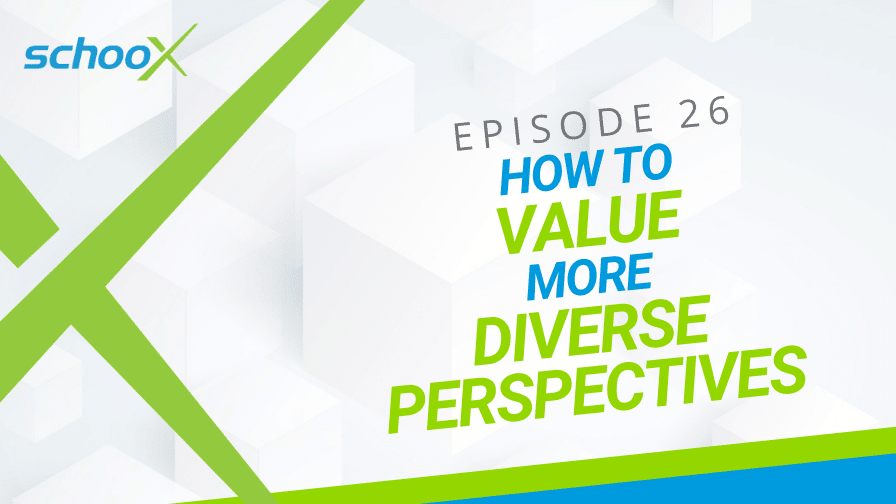12 April 2021
7 Min Read

Do you consider and encourage different perspectives in your place of work?
There’s a lot more open discussion in the world today, and more people value the spirit of inclusion and diversity. But for some, there’s still a long way to go, particularly in the workplace.
How you approach open discussion in the workplace can significantly affect collaboration, morale, and productivity.
Are you actively seeking to learn from others with different opinions, experiences, and backgrounds? If not, what valuable ideas and perspectives could you be missing out on? Hearing differing perspectives that challenge our own has great benefits.
In this episode, Schoox VP of Learning and Brand Success Matthew Brown discusses the importance of valuing different perspectives.
Listen to The Learning Exchange podcast episode below to learn more or keep reading.
The benefits of seeing a different perspective
Hearing different opinions has multiple benefits. It makes everyone feel heard and understood. But it also helps us broaden how we think about things and how we approach problems.
L&D professionals or a managers can greatly benefit from creating a safe space for people to share their diverse opinions.
Sometimes it’s not easy to hear differing opinions, especially if they are directly challenging your own. But it’s important to fight any defensiveness that often comes up when a challenge presents itself. The benefits will always outweigh any initial discomfort.
The difference between feedback and valuing different perspectives
By listening to different perspectives, we don’t just mean getting some simple feedback.
It’s important to understand the difference between seeking feedback and valuing different perspectives. Feedback is great. But many people are programmed to give positive feedback. While it may be constructive, it may not offer too much in the way of change.
Most feedback won’t go too far outside what you’ve put in front of them. Try to present a completely different perspective that is outside the box and offer something entirely unique.
Different perspectives and problem-solving
We have only lived in our own world, so we only have our own experiences to draw from. Unless we’re open to hearing and encouraging other perspectives, we may never know other experiences or skillsets. And that could be the very thing we need to solve a problem.
Let’s look at an example. Say you are in a meeting about a new project, such as a new learning program or training course. The people in that meeting may not necessarily consume the program themselves. They’re not the target audience. They may create an excellent course for people at their skill or experience level. But it could completely miss the mark for the people taking the course.
It may not be useful for people with lesser experience or completely different skillsets. For example, you need to get everyone up to speed. Maybe you should start the course at Step A instead of Step C.
The outcome you want your course to bring may not happen the way you want it to.
In this case, try seeking an outside perspective. It could help you create a course that fits the needs of those actually consuming it.
Are you in a similar position? Consider whether you may be too close to the topic to give your audience what it needs.
There are no stupid questions, only different perspectives
Have you ever been at an event where someone makes a comment or asks a question intended as a joke? And the audience or moderator casually laughs it off?
What would happen if, instead of disregarding it, we nurtured the conversation and opened a dialogue? Maybe you could say something like, “Tell me more about it,” or “Why do you think that?” Encourage them to speak their mind and share their thoughts openly without judgment.
When something like this happens, you will likely notice that the energy in the room changes. The moderator has decided to create a safe space where people feel more open to talking.
When people know others won’t ridicule them for “stupid questions,” they will be much more open to sharing. When people are comfortable sharing their own thoughts and experiences, everyone wins.
What if people aren’t open to different perspectives?
At some point, you will likely run into people who are less open to other opinions. They may approach things more cynically or will be stubborn to change.
While this can be a challenge, it’s an opportunity to lead by example. You can demonstrate what it looks like to embrace different perspectives. And you can show what happens when someone opens up a dialogue.
Handling difficult conversations
Training yourself to hear other perspectives has another benefit as well. It can make dealing with difficult conversations much more productive.
Whether it’s a difficult guest, customer, or employee, seeing different perspectives can really help you step outside of your preconceptions. You can step outside, recognize when something is wrong when you might normally get defensive. Developing this skill can make you a much better leader.
Try challenging yourself. Pick an upcoming project and bring a diverse group of individuals together to collect feedback.
Actively seek out different perspectives. When you listen to and represent others’ voices, they are much more likely to engage with an open mind. And that’s how we all learn.
RELATED RESOURCES



